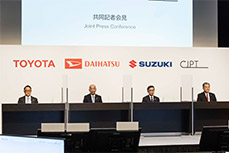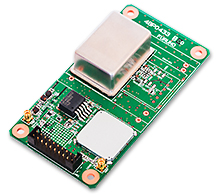Articles for ITS market
Toyota-led Connected Technology to Transform Commercial Vehicle Business
-From light trucks to large trucks and buses-
Five companies are collaborating to take a big step toward carbon neutrality
Finally, the commercial vehicle business has reached a major turning point.
Three presidents, Toyota, Suzuki, and Daihatsu, held a joint press conference on July 21, 2021, revealing that the three companies will cooperate in the business of light commercial vehicles.
Suzuki and Daihatsu have been rivals in the mini car market for many years, but in the midst of the so-called "once-in-a-century revolution in the automobile industry," Toyota has taken the lead in bringing the two companies together.
Specifically, when Toyota, Isuzu and Hino announced their business collaboration in March 2021, a joint venture called Commercial Japan Partnership (CJP) was established under the leadership of Toyota, and Suzuki and Daihatsu join it.
With the establishment of the five-company structure, CJP will account for 70% to 80% of all commercial vehicles manufactured and sold in Japan. It also provides full coverage of long-distance transportation by large buses and trucks, intra-city and regional transportation by small and medium-sized trucks, and small deliveries by light trucks.
There are two main purposes for the five companies to collaborate.
First, of course, is the support for carbon neutrality.
The Japanese government presented its Green Growth Strategy in December 2020, aiming to achieve carbon neutrality by 2050. Carbon neutrality is the concept of offsetting the amount of carbon dioxide (CO2) emitted by companies and individuals in their social activities, with the amount absorbed by forests and other natural areas. In addition, in his policy speech at the ordinary Diet session in January 2021, Prime Minister Suga clearly stated that "100% of new cars, including mini cars, will be electrically powered by 2035 at the latest," and the collaboration between Suzuki and Daihatsu in mini cars was seen as essential.
CJP breaks down barriers to commercial vehicles
Another objective is to increase customer convenience.
For the automotive manufacturer, customers are transportation companies and shippers, as well as the general public who receive packages and shop at supermarkets.
A firm grasp of the overall picture of the movement of goods, or logistics, on the part of automobile manufacturers will strengthen cooperation among delivery service providers and reduce total transportation and delivery times, thereby reducing costs and keeping food products fresh. Changing the view, it can be said that there is hardly any mechanism to penetrate the whole logistic at the present time.
In other words, at present, there is almost no system that can integrate the entire logistics system.
Looking at the commercial vehicle market in figures, the number of vehicles owned in Japan is 78 million, of which about 40%, or 31 million, are mini vehicles. In addition, 8 million units, or about a quarter of the 31 million units, are light commercial vehicles.
As for light commercial vehicles, small one-box cars such as Suzuki's "Carry" and Daihatsu's "HIJET" are used for small deliveries by major transporters such as Yamato Transport and Sagawa Express. In addition, light trucks such as Suzuki's "Carry Truck" and Daihatsu's "HIJET Truck" are used in a wide range of fields including agriculture, construction, and building.
On the other hand, looking at the logistics industry from another perspective, there are about 60,000 logistics companies in Japan in total, and about 70% of them are individuals or small businesses with less than 20 employees.
Toshihiro Suzuki, president of Suzuki Motor Corporation, and Soichiro Okudaira, president of Daihatsu Co., Ltd. expressed that the field of logistics is operated by wisdom and intuition based on human experience.
In other words, there are few cases where data on the operation methods of individual companies and data sharing among vendors are used.
The data management system developed by CJP will revolutionize this situation.
They will monitor the voices of people in the field which have not been fully grasped by the automotive manufacturers and devise various plans. They will then test these plans in various locations throughout Japan. Toyota's President Akio Toyoda has always said "First try it." this is the business strategy that they will implement throughout the entire logistics business.
Based on the concept of "putting the customer first" and "putting the field first" Isuzu Hino Suzuki and Daihatsu will take the lead in standardizing their connected technologies which have been developed independently by each company.
Response to electrification and collaborate in areas other than light commercial vehicles
With regard to electrification toward carbon neutrality, how will you promote the common use of electric components and vehicle bodies?
In this regard, Daihatsu President Okudaira explained that the company already has a track record of development in the EV CAS (EV CAS) and ZEV Factory.
EV CAS is the EV C.A. Spirit, a joint development company for EV-related technologies established mainly by Toyota, Denso and Mazda. The company has already been dissolved as it has achieved its original purpose. The ZEV Factory is Toyota's internal EV development division.
President Okudaira then said, Naturally, we will continue to collaborate with Suzuki on electrification technology, but we will be discussing the specifics in earnest from now on."
The other thing that caught our attention was the collaboration on mini passenger cars.
Suzuki's president, Suzuki, said, At this time we are collaborating on light commercial vehicles, but of course now we will also collaborate on mini passenger cars."
Reforms of the commercial vehicle business have immediately started under Toyota's leadership.
It is likely that a new corporate collaboration with Toyota at the core will be promoted, not only for commercial vehicles but also for passenger cars.
Writer introduction

Mr. Kenji Momota Automotive journalist
His major is the world automotive industry and he is also familiar with the energy industry, IT and the aging society problem as the related fields. He acts around the world based in Japan and USA and writes for the general magazines, the technology journals and the automotive related media etc.
He is also commentator of motor race and world's motor show on TV program based on his career of the driver of Indy Racing League and NASCAR. In recent years, he has been covering about a paradigm shift from developed countries to developing countries, the motorized vehicle like EV and the telematics.
FURUNO ITS Journal
Click here for the latest articles after 2022 (in Japanese)2022
- The "realistic" self-driving roadmap shown by the Japanese government and a hands-on report on the latest Subaru EyeSight X
- Will FCVs (Fuel Cell Vehicles) Become Popular? ~New Movement in Toyota and Honda~
- The 'Complete' online sales of new cars start in Japan. Will this new way of buying cars take root?
- Many Firsts! On-Site Report from Tokyo Auto Salon 2022 - The author, who knows what goes on behind the scenes, looks back on 40 years of history. -
2021
- "Moving toward zero traffic fatalities for four-wheeled and two-wheeled vehicles globally in 2050" ~Experience on Honda's latest safety technologies~
- Tsuneishi Shipbuilding's building and DX, an exclusive visit to the main factory
- Japan's Smart City: New Moves toward Practical Use
- When will self-driving buses (service cars) be put to "full-scale" practical use?
- Utilization vehicle data during disasters
- Toyota-led Connected Technology to Transform Commercial Vehicle Business -From light trucks to large trucks and buses-
- Toyota enters the connected car "Personalization" business
- Japanese automakers' carbon-neutral strategies swept up in ESG investment
- Drive experience of the latest autonomous vehicle models and advanced driving support systems
- Will carbon neutrality accelerate the trend to strengthen LCA (Life Cycle Assessment)?
- Semiconductor shortage exposes realities of the automotive industry
- Online Autonomous Driving Contest Enhancing development of Human Resources
2020
- What happens to CASE when gas cars are banned in Japan?
- When will Flying Cars be launched?
- Expectation vs. reality:Autonomous Driving in Japan
- V2X, Becoming increasingly important in autonomous driving
- Technology of Subaru “EyeSight X”
- Lifestyle-oriented French cars gain popularity in Japan
- Human-oriented smart cities are wanted
- MaaS and CASE, how would automotive industry change after COVID-19?
- The beginning of virtualization era, triggered by COVID-19
- Trend of EV shift and consumer demands
- TOYOTA Press conference about ADAS - Releasing algorithm for "sudden acceleration suppression during attempted sudden acceleration" free of charge -
- The Japanese automotive industry in 2020 - 3 turning points -
- "Using a smartphone while driving" and "Level 3 automated driving"
2019
- Motor show business model is at a turning point - Tokyo Motor Show Report -
- Commercialization and monetization of MaaS - ITS World Congress Singapore Report -
- Android Automotive pays attention to V2X - Report from the Frankfurt Motor Show 2019 in Germany -
- Automobile Distribution Revolution and DCM (Data Communication Module)
- Connected business potential and newly proposed "eMaaS" by Honda
- 5G services for practical use are multiplying
- Connectivity technologies attracting attention due to frequent traffic accidents
- Shanghai Motor Show report -SUV, EV, Automated car & 5G-
- Drone Business roadmap and updates to Michibiki (Quasi-Zenith Satellite System)
- MaaS (Mobility as a Service) "town development." Full-scale promotion for a national project
- CES organizer states "Data Period in 2020s." Transformation of the Automotive Industry in CES, US "-CES2019 Report-"
- "Return to Origin" directed towards the age of change, automatic operation and connectivity
2018
- New proposal for Private Car Automated Driving Level and other Hot 5G Technology Topics
- Standardized EV charging infrastructure concerns in Europe, US, Japan and China - Kobe EVS 31 field report -
- Touring a pure car carrier and a test drive of the latest hybrid car
- Planning stage products are exhibited at the newly established visualized mobility service "TOYOTA MOBILITY SHOWROOM".
- Potential “Community Car-share” program promoted by local residents
- CES Asia Report 2108
- Companies attempt new Vehicle-to-Infrastructure communications, including traffic volume measurements and vehicle positioning. -ITS Asia Pacific Forum in Fukuoka-
- Geneva show in Switzerland. Flying cars and MaaS (Mobility as a Service) were hot topics.
- EV (Electric Vehicle) proposals by country
- MaaS competition through service mobilization, M & A and technical field collaboration is accelerating. - The CES 2018 Report -
2017
- Big data’s initiative and fight for the automotive industry. Cooperation among companies becomes increasingly important.
- Connected car and road-to-vehicle communication automatic operation
- ETC (Electronic Toll Collection) and ETC2.0. Current situation and projected future
- Rapid development of sharing economy
- Germany is first to recognize level 3 automated driving
- ITS EU 2017 Field Reports -Automatic Operation and the eCall-
- From Infotainment to ITS, the competitive area is spreading in the car big data industry.
- GTC (GPU Technology Conference) Report and the de facto standardization of AI (artificial intelligence)
- Renesas' new challenge! "e-AI Solution" and "Renesas Autonomy"
- The Automobile industry is shifting from a manufacturing industry to a service industry.
- The movement toward accident countermeasures for aging drivers in Japan
- Fusion of ride sharing and fully automated driving is advancing in the USA.
2016
- Overview of the Quasi-Zenith Satellite System (QZSS) and advancements toward full-scale practical use including the Tokyo Olympic Games - G-space EXPO 2016 report-
- Japan’s automated driving project "SIP-adus" will be a large demonstration experiment.
- The International Home Care & Rehabilitation Exhibition. There were many car manufactures with exhibits booths at this show.
- Japanese car manufacturers starting to concentrate on strengthening the ADAS system
- A new movement of legislation for autonomous cars
- Cyber Security and “AGL”, the new OS for automotive are hot topics in the connected car industry
- “High precision 3D map” the key future of autonomous car and pedestrian dead reckoning
- Chinese “BAT” is accelerating their business in the EV (Electric Vehicle) market
- Tesla's original connection to Taiwan and the new transportation system technologies.
- "The main topic" of the Geneva Motor Show was how to strengthen "pedestrian protection"
- The probe data business is getting more competitive
- Reporting directly from the 2016 CES show "Data services will soon become the main revenue source of automotive industry"
2015
- Do the automated driving systems need the GNSS (Global Navigation Satellite System) ?
- ETC Version 2.0 is coming soon. A new service was announced at the Tokyo Motor Show and the possibility that is could be used as a device for older drivers.
- "Connected Horizon" and "eHorizon". Germany's leading parts supplier accelerates strengthening of "Big Data" for business



 Collaboration between Toyota, Isuzu and Hino announced in March 2021. Source: Toyota.
Collaboration between Toyota, Isuzu and Hino announced in March 2021. Source: Toyota. In July 2021, Toyota, Suzuki and Daihatsu announced their collaboration, with Suzuki and Daihatsu joining the CJP (Commercial Japan Consortium). Source: Toyota
In July 2021, Toyota, Suzuki and Daihatsu announced their collaboration, with Suzuki and Daihatsu joining the CJP (Commercial Japan Consortium). Source: Toyota GPS/GNSS Receiver&Chips and Modules (positioning and timing)
GPS/GNSS Receiver&Chips and Modules (positioning and timing)